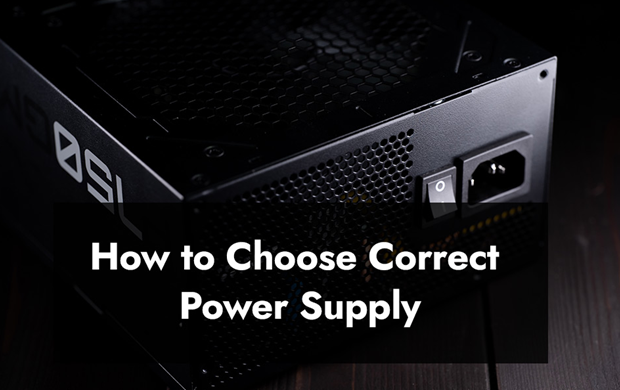A PSU (Power Supply Unit) is one of the main components of a computer system that alters the main AC (Alternating Current) to low-voltage DC (Direct Current) Power Supply for the core elements of a computer. They deliver a signal to the motherboard to specify when the Direct Current voltages are within specification so that the system is able to securely boot and power up.
When installing a new workstation in the office, there are many hardware specs to consider, but one should first focus on the PSU. Selecting a substandard or faulty Power Supply usually leads to poor performance and unstable systems. One should make sure they have a flawless power supply for their workstations to stay away from any trouble.
Choosing a PSU for PC
Power supplies are often overlooked and misunderstood PC components. Several users pick a PC Power Supply based only on overall wattage, considering that higher is always equal to better. Others give no consideration to their PSU choice at all and go for whatever disgrace arrived with their device. But seeing how significant a decent PSU is to a system’s reliability and stability, it’s an embarrassment that Power Supplies get so little attention when compared to modern-looking components like SSDs and graphics cards. Following are the things you should consider before buying a Computer Power Supply:
- Consider Larger PSUs:
Although they are quite bulky, bigger Power Supply Units are much more reliable than light models. Bigger PSUs come with more advanced core components & improved cooling management. Fans are bigger too, which means they make less noise, can move more air, and keep your workstation cool.
- Efficiency Ratings:
Highly efficient Power Supply Units consume less energy, have more effective components, and produce less heat, which protects you from large monthly energy & cooling bills. The best way to discover that your PSU is effective is to go for ones with 80 Plus authorizations. This warranty means that a component is at least 80% effective and loses about 20% as heat.
It should be noted that advanced efficiency ratings are equal to higher prices, so be certain to evaluate the cooling savings and potential energy in contrast to the upfront rate of the PSU. The efficiency rating is strong-minded by its performance in a 115-volt computer system, and the ratings are increased further as you go up the ranking of precious metals.
- 80 PLUS
- Bronze 80 PLUS
- Silver 80 PLUS
- Gold 80 PLUS
- Platinum 80 PLUS
- Titanium 80 PLUS
- Choose the Cables Wisely:
Cabling comes in three options; fully modular cabling, partially modular, and hard-wired cabling.
- Fully modular means all cables of PSU are removable, making cable management and installation easy. However, these models are much more costly than other categories of cabling.
- Partially modular is the best among all. These provide necessary cables for the Power Supply, giving space for other components at a reasonable price.
- The third type of (Hard-wired) cable is directly connected to the Power Supply box. As the number of plugs is restricted & not suited for customization in this setup, it is cheaper than the rest of the two.
- Choose a Renowned Manufacturer:
If possible, your Power Supply Unit should be prepared by a reliable designer/manufacturer that comes with comprehensive support and reasonable warranties. Most people prefer to select Sea Sonic, Corsair, and Antec PSUs, but you must take time to investigate the products. You can look for user reviews about the specific model and make of your PSU but, if that is not conceivable, get a hardware specialist’s expert opinion. Following are the manufacturers you can choose from:
- Corsair
- EVGA
- Sea Sonic
- Cooler Master
- Antec
- Silverstone
- Thermaltake
- Bitfenix
- Be Quiet!
- How Many Watts?
When picking a new Power Supply, one of the most common questions is, “How many watts are enough?” The answer widely depends on the exclusive requirements of your computer system. As an overall rule, it’s better to go for higher wattage relatively than trying to match your needs precisely. If you’ve considered that the system is going to utilize 500 watts (a frequent number for a gaming build), selecting a 600 or 650-watt PSU output might be a good choice, as it will provide you more wattage to work with.
- Protection:
Some PSU manufacturers will make protections to keep your elements safe from power-affiliated issues. These safeties usually increase the cost of a power supply, but they can also provide some extra peace of mind.
- The first one is overvoltage safety, which denotes a mechanism or circuit that closes the power supply down in case the output voltage surpasses the stated voltage limit. This defense is crucial since high voltages can cause damage to processor components that attach to the PSU.
- The second one is overcurrent and overload protection. These are circuits that turn off the Power Supply Unit when there is extreme power load, or current detected, counting short circuit currents.
- Noise:
People have started to realize the impact PSU has on a computer system’s overall sound output. As strange as it sounds, your PSU can play an important role in the sound of your PC undergoing load. The Cybernetics sound ratings are given below.
- A++ <15 dBA
- A+ 15 – 20
- A 20 – 25
- 25 – 30
- Standard 30 – 35
- 35 – 40
- 40 – 45
Final Verdict
Choosing the right PSU for your computer system should involve more than just finding the maximum number of watts at an inexpensive price. You need to think about efficiency, protection, amperage, and the cables you need, along with any extra features you are looking at.



